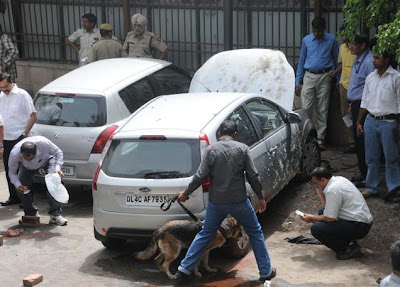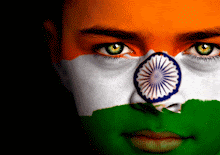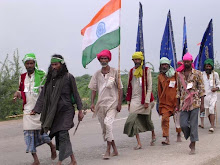
The explosion prompted Delhi Police to sound an alert in the city and strengthen security by deploying more personnel on streets and crowded places like markets and to intensify checking of vehicles.
The explosive kept in a white polythene bag near a lawyer's car parked at Gate No 7 on Service Road went off at around 1.25 pm causing panic and three minutes later, police received the call regarding the blast.
Police was groping for clues in the blast and were hesitant to hazard a guess about who was behind it.
"It was not an accident. There was a minor explosion. A packet containing explosives kept in a plastic bag near the car's right side exploded. There were minor damages to the car. There was no casualty or injuries," Dharmendra Kumar, Special Commissioner (Law and Order), told reporters.
Today's blast was the second in the last eight months, the previous one being a blast in car on September 19 last year near Jama Masjid for which terror outfit Indian Mujahideen took responsibility. That blast took place after two unidentified men opened fire at a Taiwanese media crew ahead of the Commonwealth Games.
Noting that the nature of the explosives is yet to be ascertained, he said the car owner has nothing to do with the incident. He said lawyer Rajat Jain had parked his car and had gone to the canteen to have food.
"There was a sudden blast in the parking lot. We rushed to the spot and found a black bag burning beside the car," said parking attendant Dharamvir.
Justice Sanjay Kishan Kaul and Justice GS Sistani as also Delhi Police chief BK Gupta visited the spot.
Lawyers having refreshment in a canteen inside the court complex and near the parking lot rushed outside after they heard a loud explosion.
"I was in canteen having a soft drink. At around 1:25 pm I heard a loud explosion outside gate no 7. I rushed outside and saw a burning plastic bag near a car. It was just below the bonnet," a lawyer Safroz said.




 However, besides other previous suicide attacks, conducted in the Marriot Hotel at Islamabad, Rescue 15 building at Lahore which also damaged other buildings of the Lahore Capital City Police Office (CCPO) and Inter Services Intelligence (ISI) which was the main target, but could not be hit due to heavy firing by the security guards on the terrorists who came along with the vehicle and arms—were some of the other events of the same war against Pakistan. Nevertheless, the terror-incidents, especially at Naval Base in Karachi, at GHQ in Rawalpindi and in Lahore at FIA Building, Manawan Police Training Centre and Bedian Elite Police Training Centre which had involved gun battles between the terrorists and the security forces along with pattern of subversive acts through suicide attacks and bomb blasts which have also been intensified in the past few days—clearly show that secret CIA, RAW and Mossad have been waging a new style war against Pakistan, which also includes tactics of guerilla warfare—through their well-trained insurgents who could conduct attacks in major cities despite Pakistan’s successful military operations against the militants and the death of the renowned militant commanders.
However, besides other previous suicide attacks, conducted in the Marriot Hotel at Islamabad, Rescue 15 building at Lahore which also damaged other buildings of the Lahore Capital City Police Office (CCPO) and Inter Services Intelligence (ISI) which was the main target, but could not be hit due to heavy firing by the security guards on the terrorists who came along with the vehicle and arms—were some of the other events of the same war against Pakistan. Nevertheless, the terror-incidents, especially at Naval Base in Karachi, at GHQ in Rawalpindi and in Lahore at FIA Building, Manawan Police Training Centre and Bedian Elite Police Training Centre which had involved gun battles between the terrorists and the security forces along with pattern of subversive acts through suicide attacks and bomb blasts which have also been intensified in the past few days—clearly show that secret CIA, RAW and Mossad have been waging a new style war against Pakistan, which also includes tactics of guerilla warfare—through their well-trained insurgents who could conduct attacks in major cities despite Pakistan’s successful military operations against the militants and the death of the renowned militant commanders.



 Iraqi officials have been scrambling to show they're in control of security in the wake of Osama bin Laden's death on Monday, but the uptick of bombings suggests that al-Qaida-linked groups in Iraq remain a threat despite the death of their ideological patron.
Iraqi officials have been scrambling to show they're in control of security in the wake of Osama bin Laden's death on Monday, but the uptick of bombings suggests that al-Qaida-linked groups in Iraq remain a threat despite the death of their ideological patron. Violence in Iraq has dropped dramatically since just a few years ago, and Iraqi forces have firmly taken over security responsibilities from American troops. But many Iraqis and U.S. officials worry question whether the departure of the roughly 46,000 American soldiers still here will leave their country more vulnerable to violence.
Violence in Iraq has dropped dramatically since just a few years ago, and Iraqi forces have firmly taken over security responsibilities from American troops. But many Iraqis and U.S. officials worry question whether the departure of the roughly 46,000 American soldiers still here will leave their country more vulnerable to violence. The fact that the bomber was able to wipe out so many policemen in one blast immediately raised questions about security at the building.
The fact that the bomber was able to wipe out so many policemen in one blast immediately raised questions about security at the building.
 osama bin ladens first dead body photo leaked.
osama bin ladens first dead body photo leaked.
 Six to seven policemen were among the injured, some in critical condition.Security agencies cordoned off the area and the injured were shifted to the hospital where emergency was imposed. A bomb disposal squad was sent to the site and rescue operations were launched.
Six to seven policemen were among the injured, some in critical condition.Security agencies cordoned off the area and the injured were shifted to the hospital where emergency was imposed. A bomb disposal squad was sent to the site and rescue operations were launched. The mosque was damaged in the blast. The wall of the nearby police station was also severely damaged.This area had earlier came under attack last month when the convoy of JUI-F party chief Maulana Fazlur Rehman was targeted.Security in the area was beefed up earlier in the morning when news about al-Qaida chief Osama bin Laden's death spread out. Local media reports said the al-Qaida-linked Taliban have vowed more suicide attacks across Pakistan, even against the country's president Asif Ali Zardari.
The mosque was damaged in the blast. The wall of the nearby police station was also severely damaged.This area had earlier came under attack last month when the convoy of JUI-F party chief Maulana Fazlur Rehman was targeted.Security in the area was beefed up earlier in the morning when news about al-Qaida chief Osama bin Laden's death spread out. Local media reports said the al-Qaida-linked Taliban have vowed more suicide attacks across Pakistan, even against the country's president Asif Ali Zardari. 


 A firefighter waves to the crowd as people celebrate after Al Qaeda leader Osama bin Laden was killed in Pakistan, during a spontaneous celebration in New York's Times Square, May 2, 2011
A firefighter waves to the crowd as people celebrate after Al Qaeda leader Osama bin Laden was killed in Pakistan, during a spontaneous celebration in New York's Times Square, May 2, 2011





